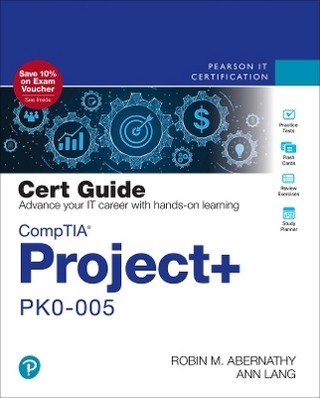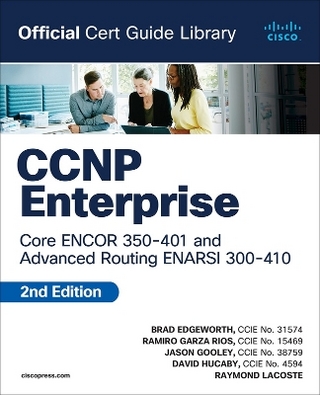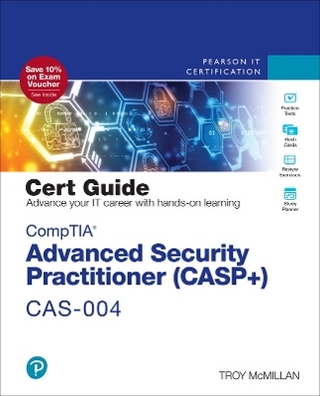
CompTIA IT Fundamentals+ FC0-U61 Cert Guide
Pearson IT Certification
978-0-7897-6041-8 (ISBN)
- Titel z.Zt. nicht lieferbar
- Versandkostenfrei innerhalb Deutschlands
- Auch auf Rechnung
- Verfügbarkeit in der Filiale vor Ort prüfen
- Artikel merken
Master CompTIA IT Fundamentals FC0-U61 exam topics
Assess your knowledge with practice questions
Review key concepts with exam preparation tasks
Practice with realistic exam questions
Get practical guidance for next steps and more advanced certifications
CompTIA IT Fundamentals Cert Guide is a best-of-breed exam study guide. Leading IT certification expert Mark Edward Soper shares preparation hints and test-taking tips, helping you identify areas of weakness and improve both your conceptual knowledge and hands-on skills. Material is presented in a concise manner, focusing on increasing your understanding and retention of exam topics.
The book presents you with an organized test preparation routine through the use of proven series elements and techniques. Exam topic lists make referencing easy. Chapter-ending Exam Preparation Tasks help you drill on key concepts you must know thoroughly. Review questions help you assess your knowledge, and a final preparation chapter guides you through tools and resources to help you craft your final study plan.
The companion website contains the powerful Pearson Test Prep practice test software engine, complete with hundreds of exam-realistic questions. The assessment engine offers you a wealth of customization options and reporting features, laying out a complete assessment of your knowledge to help you focus your study where it is needed most.
Well regarded for its level of detail, assessment features, and challenging review questions, this CompTIA study guide helps you master the concepts and techniques that will allow you to succeed on the exam the first time.
The CompTIA study guide helps you master all the topics on the IT Fundamentals exam, including:
IT concepts and terminology, including data types, input, processing, output, storage, the value of data and information, and basic troubleshooting methods
Infrastructure, including I/O hardware, peripheral setup/installation, internal computer components, Internet service types, storage types, computing devices, and networking
Applications and software, including software management, operating system components, software types and uses, application architecture and delivery models, web browser configuration, application concepts, and best practices
Software development concepts, including types of programming languages, programming organization techniques and logic, and basic programming concepts
Database concepts, purposes, structures, and interfaces
Security issues, including confidentiality, integrity, and availability; device security; behavioral security; authentication and authorization; password best practices; encryption; and business continuity concepts
Companion Website
The website contains two free, complete practice exams.
Includes Exclusive Offer for up to 70% Off Premium Edition eBook and Practice Test
Pearson Test Prep online system requirements:
Browsers: Chrome version 40 and above; Firefox version 35 and above; Safari version 7; Internet Explorer 10, 11; Microsoft Edge; Opera. Devices: Desktop and laptop computers, tablets running on Android and iOS, smartphones with a minimum screen size of 4.7". Internet access required.
Pearson Test Prep offline system requirements:
Windows 10, Windows 8.1, or Windows 7; Microsoft .NET Framework 4.5 Client; Pentium-class 1 GHz processor (or equivalent); 512 MB RAM; 650 MB disk space plus 50 MB for each downloaded practice exam; access to the Internet to register and download exam databases
Mark Edward Soper has been working with PCs since the days of the IBM PC/XT and AT as a salesperson, technology advisor, consultant, experimenter, trainer, technology writer, and content creator. Since 1992, he has taught thousands of students across the country how to repair, manage, and troubleshoot the hardware, software, operating systems, and firmware inside their PCs. He has created many versions of his experimental computer known as “FrankenPC” for this and previous books. Mark earned his CompTIA A+ Certification in 1999 and has written several A+ Certification books for Pearson imprints. Mark is also the author of The PC and Gadget Help Desk: A Do-It-Yourself Guide To Troubleshooting and Repairing. Other books Mark has authored or co-authored include three editions of Easy Windows 10, Easy Windows 8.1, Easy Windows 8, Easy Microsoft Windows 7, and Sams Teach Yourself Microsoft Windows 7 in 10 Minutes, books on computer troubleshooting, home networking and broadband Internet, home automation, Raspberry Pi singleboard computers, and digital photography. Mark is also the creator of Building and Repairing PCs (Que Video). Mark has also written many blog entries and articles for MaximumPC.com and Maximum PC magazine. He currently teaches Microsoft Office for the University of Southern Indiana and Ivy Tech Community College in Evansville, Indiana, and also has taught A+ Certification and other technology-related subjects at Ivy Tech Community College. See Mark’s website at www.markesoper.com for news and information about upcoming projects.
Introduction xiii
Chapter 1 Welcome to CompTIA IT Fundamentals+ 3
Domain 1.0—IT Concepts and Terminology 5
Domain 2.0—Infrastructure 5
Domain 3.0—Applications and Software 6
Domain 4.0—Software Development Concepts 6
Domain 5.0—Database Fundamentals 7
Domain 6.0—Security 7
Hardware, Equipment, and Tools 8
Software 9
Part 1: Domain 1.0 – IT Concepts and Terminology
Chapter 2 How Computers Store Data: Notational Systems 13
Foundation Topics 13
Binary 13
Hexadecimal 14
Decimal 17
Data Representation 18
Exam Preparation Tasks 21
Practice Questions for Objective 1.1 22
Your Next Steps 25
Chapter 3 Compare and Contrast Fundamental Data Types and Their Characteristics 27
Foundation Topics 27
Char 27
Strings 27
Numbers 28
Boolean 30
Exam Preparation Topics 32
Practice Questions for Objective 1.2 32
Your Next Steps (More Certs) 35
Chapter 4 Input, Output, and More: The Basics of Computing and Processing 37
Foundation Topics 37
Input 37
Processing 39
Output 41
Storage 43
Exam Preparation Tasks 43
Practice Questions for Objective 1.3 44
Your Next Steps (More Certs) 48
Chapter 5 Explain the Value of Data and Information 51
Foundation Topics 51
Data and Information as Assets 51
Importance of Investing in Security 51
Relationship of Data to Creating Information 52
Intellectual Property 54
Digital Products 58
Data-Driven Business Decisions 58
Exam Preparation Tasks 60
Practice Questions for Objective 1.4 61
Your Next Steps (More Certs) 65
Chapter 6 Common Units of Measure: Storage, Throughput, and Speed 67
Foundation Topics 67
Storage Units 67
Capacity Comparison 71
Throughput Unit 73
Processing Speed 75
Exam Preparation Tasks 77
Practice Questions for Objective 1.5 78
Your Next Steps 83
Chapter 7 Explain the Troubleshooting Methodology 85
Foundation Topics 85
Identify the Problem 85
Research Knowledge Base/Internet, If Applicable 99
Establish a Theory of Probable Cause 100
Test the Theory to Determine the Cause 102
Establish a Plan of Action to Resolve the Problem and Identify Potential Effects 104
Implement the Solution or Escalate as Necessary 105
Verify Full System Functionality and, If Applicable, Implement Preventive Measures 105
Document Findings/Lessons Learned, Actions, and Outcomes 107
Exam Preparation Tasks 108
Practice Questions for Objective 1.6 109
Your Next Steps (More Certs) 113
Part 2: Domain 2.0 – Infrastructure
Chapter 8 I/O: Input/Output Device Interfaces 115
Foundation Topics 115
Networking 115
Peripheral Devices 121
Graphic Device 131
Exam Preparation Topics 135
Practice Questions for Objective 2.1 136
Your Next Steps (More Certs) 140
Chapter 9 Connecting and Configuring Peripherals 143
Foundation Topics 143
Devices 143
Installation Types 161
Exam Preparation Tasks 164
Practice Questions for Objective 2.2 165
Your Next Steps (More Certs) 169
Chapter 10 Explain the Purpose of Common Internal Computer Components 171
Foundation Topics 171
Motherboard/System Board 171
Firmware/BIOS 175
RAM 177
CPU 179
GPU 186
Storage 188
Cooling 190
NIC 193
Exam Preparation Tasks 196
Practice Questions for Objective 2.3 197
Your Next Steps 201
Chapter 11 Internet Service Types 203
Foundation Topics 203
Fiber Optic 203
Cable 205
DSL 209
Wireless 210
Comparing Internet Services 213
Exam Preparation Tasks 214
Practice Questions for Objective 2.4 215
Your Next Steps (More Certs) 219
Chapter 12 Compare and Contrast Storage Types 221
Foundation Topics 221
Volatile vs. Nonvolatile 221
Local Storage Types 221
Local Network Storage Types 238
Cloud Storage Service 242
Exam Preparation Topics 245
Practice Questions for Objective 2.5 245
Your Next Steps (More Certs) 247
Chapter 13 Compare and Contrast Common Computing Devices and Their Purposes 249
Foundation Topics 249
Mobile Phones 249
Tablets 250
Laptops 251
Workstations 252
Servers 253
Gaming Consoles 256
IoT 258
Exam Preparation Tasks 266
Practice Questions for Objective 2.6 268
Your Next Steps (More Certs) 271
Chapter 14 Explain Basic Networking Concepts 273
Foundation Topics 273
Basics of Network Communication 273
Basics of Packet Transmission 273
Device Addresses 276
Basic Protocols 280
Devices 284
Exam Preparation Tasks 287
Practice Questions for Objective 2.7 288
Your Next Steps (More Certs) 293
Chapter 15 Given a Scenario, Install, Configure, and Secure a Basic Wireless Network 295
Foundation Topics 295
802.11a/b/g/n/ac 295
Best Practices 304
Exam Preparation Topics 310
Practice Questions for Objective 2.8 311
Your Next Steps (More Certs) 316
Part 3: Domain 3.0 – Applications and Software
Chapter 16 Explain the Purpose of Operating Systems 319
Foundation Topics 319
Interface Between Applications and Hardware 319
Disk Management 319
Process Management/Scheduling 322
Application Management 324
Memory Management 330
Windows 331
macOS 332
Linux 332
Device Management 333
Access Control/Protection 335
Types of OS 336
Exam Preparation Tasks 344
Practice Questions for Objective 3.1 345
Your Next Steps (More Certs) 349
Chapter 17 Operating Systems 101: Features, Processes, UI, and Management 351
Foundation Topics 351
Features 355
File Management 366
Services 374
Processes 377
Drivers 381
Utilities 384
Interfaces 387
Exam Preparation Tasks 389
Practice Questions for Objective 3.2 391
Your Next Steps (More Certs) 395
Chapter 18 Purpose and Proper Use of Software 397
Foundation Topics 397
Productivity Software 397
Collaboration Software 403
Business Software 406
Exam Preparation Topics 410
Practice Questions for Objective 3.3 410
Your Next Steps (More Certs) 415
Chapter 19 Getting Apps From Source to Your Device 417
Foundation Topics 417
Application Delivery Methods 417
Application Architecture Models 419
Exam Preparation Tasks 421
Practice Questions for Objective 3.4 422
Your Next Steps (More Certs) 424
Chapter 20 Configuring and Using Web Browsers 427
Foundation Topics 427
Caching/Clearing Cache 427
Deactivate Client-Side Scripting 429
Browser Add-Ons/Extensions 430
Private Browsing 433
Proxy Settings 434
Certificates 436
Popup Blockers 439
Script Blockers 440
Compatible Browser for Application(s) 440
Exam Preparation Tasks 441
Practice Questions for Objective 3.5 442
Your Next Steps (More Certs) 447
Chapter 21 Compare and Contrast General Application Concepts and Uses 449
Foundation Topics 449
Single-Platform Software 449
Cross-Platform Software 449
Licensing 454
Software Installation Best Practices 458
Exam Preparation Topics 467
Practice Questions for Objective 3.6 468
Your Next Steps (More Certs) 472
Part 4: Domain 4.0 – Software Development Concepts
Chapter 22 Compare and Contrast Programming Language Categories 475
Foundation Topics 475
Interpreted 475
Compiled Programming Languages 483
Query Languages 486
Assembly Language 487
Exam Preparation Tasks 489
Practice Questions for Objective 4.1 490
Your Next Steps (More Certs) 494
Chapter 23 Using Programming Organizational Techniques and Interpret Logic 497
Foundation Topics 497
Organizational Techniques 497
Logic Components 501
Exam Preparation Tasks 505
Practice Questions for Objective 4.2 506
Your Next Steps (More Certs) 508
Chapter 24 Explain the Purpose and Use of Programming Concepts 511
Foundation Topics 511
Identifiers 511
Containers 512
Functions 512
Objects 513
Exam Preparation Tasks 514
Practice Questions for Objective 4.3 515
Your Next Steps (More Certs) 518
Part 5: Domain 5.0 – Database Fundamentals
Chapter 25 Explain Database Concepts and the Purpose of a Database 521
Foundation Topics 521
Usage of Database 521
Flat File vs. Database 528
Records 531
Storage 532
Exam Preparation Tasks 534
Practice Questions for Objective 5.1 535
Your Next Steps (More Certs) 539
Chapter 26 Compare and Contrast Various Database Structures 541
Foundation Topics 541
Structured vs. Semi-Structured vs. Nonstructured 541
Relational Databases 545
Nonrelational Databases 547
Exam Preparation Tasks 549
Practice Questions for Objective 5.2 550
Your Next Steps (More Certs) 553
Chapter 27 Summarize Methods Used to Interface with Databases 555
Foundational Topics 555
Relational Methods 555
Database Access Methods 561
Export/Import 563
Exam Preparation Tasks 568
Practice Questions for Objective 5.3 569
Your Next Steps (More Certs) 573
Part 6: Domain 6.0 – Security
Chapter 28 Confidentiality, Integrity, and Availability Concerns 575
Foundation Topics 575
Confidentiality Concerns 575
Integrity Concerns 579
Availability Concerns 581
Exam Preparation Tasks 584
Practice Questions for Objective 6.1 585
Your Next Steps (More Certs) 589
Chapter 29 Device Security Best Practices 591
Foundation Topics 591
Securing Devices (Mobile/Workstation) 591
Device Use Best Practices 602
Exam Preparation Tasks 608
Practice Questions for Objective 6.2 609
Your Next Steps (More Certs) 613
Chapter 30 Summarize Behavioral Security Concepts 615
Foundation Topics 615
Expectations of Privacy When Using... 615
Written Policies and Procedures 630
Handling of Confidential Information 631
Exam Preparation Tasks 633
Practice Questions for Objective 6.3 634
Your Next Steps (More Certs) 637
Chapter 31 Compare and Contrast Authentication, Authorization, Accounting, and Nonrepudiation Concepts 639
Foundation Topics 639
Authentication 639
Authorization 645
Accounting 650
Nonrepudiation 655
Exam Preparation Tasks 656
Practice Questions for Objective 6.4 658
Your Next Steps (More Certs) 662
Chapter 32 Explain Password Best Practices 665
Foundation Topics 665
Password Length 665
Password Complexity 665
Password History 668
Password Expiration 669
Password Reuse Across Sites 672
Password Reset Process 673
Exam Preparation Tasks 676
Practice Questions for Objective 6.5 677
Your Next Steps (More Certs) 682
Chapter 33 Explain Common Uses of Encryption 685
Foundation Topics 685
Plain Text vs. Cipher Text 685
Data at Rest 686
Data in Transit 694
Exam Preparation Tasks 697
Practice Questions for Objective 6.6 698
Your Next Steps (More Certs) 702
Chapter 34 Explain Business Continuity Concepts 705
Foundation Topics 705
Fault Tolerance 705
Disaster Recovery 717
Exam Preparation Tasks 719
Practice Questions for Objective 6.7 720
Your Next Steps (More Certs) 723
Chapter 35 Final Preparation 725
Advice About the Exam Event 725
Appendix A Answers to Practice Questions 735
Online Elements:
APPENDIX A Answers to Practice Questions
APPENDIX B Memory Tables
APPENDIX C Memory Table Answers
APPENDIX D Study Planner
APPENDIX E Content Tracking to IT Fundamentals Domains and Objectives
Glossary
TOC, 9780789760418, 10/29/2018
| Erscheint lt. Verlag | 29.3.2019 |
|---|---|
| Reihe/Serie | Certification Guide |
| Verlagsort | Upper Saddle River |
| Sprache | englisch |
| Maße | 190 x 240 mm |
| Gewicht | 1560 g |
| Themenwelt | Informatik ► Weitere Themen ► Zertifizierung |
| ISBN-10 | 0-7897-6041-X / 078976041X |
| ISBN-13 | 978-0-7897-6041-8 / 9780789760418 |
| Zustand | Neuware |
| Haben Sie eine Frage zum Produkt? |
aus dem Bereich


